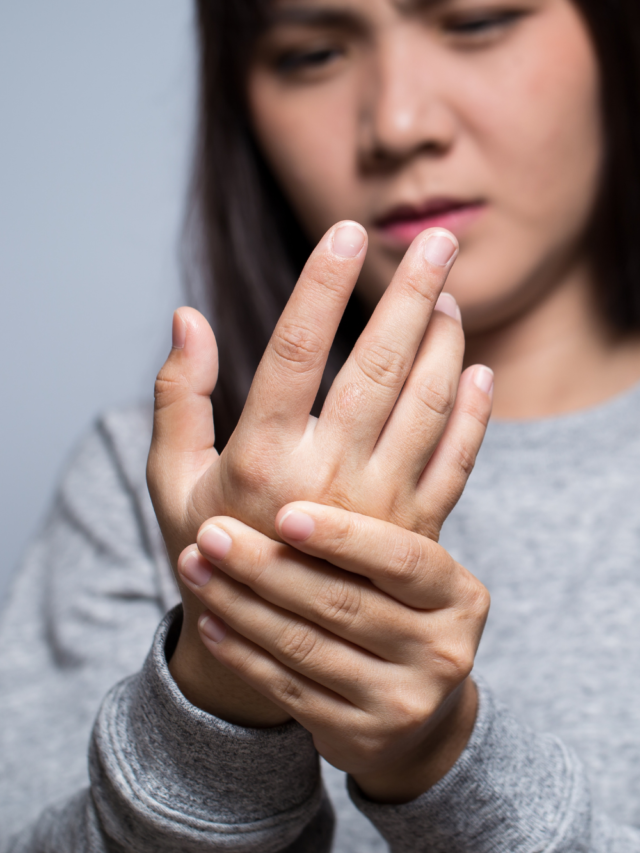This will be my first Mother’s Day as a mom, and I am bursting with thoughts and feelings. So much work, energy, healing, and luck went into making this possible. I have been open about my journey of motherhood with chronic illness – my fears of not being able to conceive, but also of getting pregnant and then being too sick to be a good mom. Being pregnant in the first half of this pandemic and then raising an unvaccinated baby as the world opens up (despite no end to the virus) have been adventures of their own. I feel eternally grateful for the support of my Friends in the Fight – my community of patients and their loved ones who get what it’s like to live with chronic illness.
While I’ve had an outpouring of love and encouragement from my Friends, I’ve had an even larger spout of questions! My not-yet-parent patient Friends are always eager to hear more about what motherhood with chronic illness is like. I remember feeling like that myself, before deciding it was time to give parenthood a go. I genuinely didn’t know – could I do this? Could my body withstand pregnancy? Childbirth? Would I have the energy to enjoy motherhood with chronic illness? Was there anything I could or should do beforehand to give myself and my child the best chance?
And so, on this my very first Mother’s Day, I’d like to share the insights I’ve learned about being a sick mom:
**Note: these are my insights, based on my experiences alone. Just like every chronic illness experience is different, no two pregnancies are the same.
1. Healing first
I always knew I wanted to be a mom, but I knew motherhood with chronic illness wasn’t going to be easy. I decided to do everything I could to prepare my body beforehand. At one point I hit a wall, wondering how on earth I could find the time for healing. Thankfully, I was laid off a few months later… this period of unemployment was challenging in its own right, but it allowed me the space to focus on finding good care and the time to rest. I saw a million specialists, nailed down a diagnosis (or three), and diligently tracked my symptoms and triggers to figure out what I could do on my own to avoid future crashes. I honed in on a diet and exercise regimen that caused more good than harm. And did I mention rest? I let myself sleep and lay down to my body’s content.
And what a world of difference it all made. The fog lifted and the constant pain eased. My gut learned, for the first time in over a decade, what it felt like to work properly. Not only did this healing result in my hormones self-regulating, allowing me to conceive without intervention, but it gave me the energy and routines I needed to get through the next chapter of my life.
This healing was made possible by lucky timing, constant support, and immense privilege. I am ever grateful to have had this opportunity. It also took a lot of hard work, and I mention all this because I am glad every day to have done that work. It gave me tools and habits that I lean on daily. Motherhood with chronic illness is a huge commitment. It’s tough, with a baby, to find moments to cook or exercise, for example. I spent years perfecting the recipes and workouts developed during my healing year so that they are now second nature. I can’t imagine trying to figure out all of that as a new parent.
2. My body will never be the same
I think rationally I knew this on some level, but I continue to be floored (sometimes literally!) by how drastically my body was altered by pregnancy. I have seen my body change from illness over the years –
- weight fluctuations
- pallor
- scarring
- stretch marks
- various degrees of joint deterioration…
but having so much change over less than a year was remarkable. My hair got so thick and then it all fell out. My thighs grew multiple sizes and then disappeared. Most surprising were the beneficial changes – my spine, which has been fairly unstable for years with vertebrae that rotate and misalign regularly, was solid for the entire pregnancy! My food allergies evaporated, allowing for cravings with no histamine restrictions! Sure, my hips and SIJ didn’t appreciate the extra pressure, and I had my fair share of nausea and headaches. But most of my symptoms actually improved! After years of fearing that my body couldn’t handle pregnancy, it turned out to be the healthiest year I’d had in quite some time. The improvements lasted for several months after she was born, too. I woke up every day with the relief of another day unencumbered.
Not all of the shifts bounced back, however. My pelvic floor, which was further jeopardized by EDS, has not found its way back to a state of comfort and function. My bladder, already prolapsed years ago, makes peeing exhausting these days. It seems my abs will never be what they once were. My periods are remarkably different, but my cycles seem more regular. Less impactful, my feet grew half a shoe size, requiring a trip to the shoe store.
3. Pregnancy is not the only option
I loved being pregnant, and I am so fortunate to have had a positive experience! I know many others, especially with autoimmune issues, who found similar relief from pregnancy, sometimes permanent. One EDS specialist told me that she had a patient who chose to have five children because she felt so much healthier when pregnant! There are many, however, who have not been so lucky. My sister — despite sharing genetics and diagnoses — struggled with joint laxity, food allergies, and POTS throughout pregnancy. I’ve met MCAS patients who were asymptomatic until pregnancy. Pregnancy and motherhood with chronic illness can vary wildly for different people.
While it’s scary to not know which experience will be yours, there are other options for becoming a parent. Of my group of chronic-patient-new-parent friends, one chose adoption and another chose surrogacy. Both feel that the decision they made was right for their body, and it has been wonderful to witness each process. Pregnancy and birth were two of the most impactful experiences on my body, and while I am glad to have been pregnant, I think it is likely that I will choose another option in the future.
4. Setting up supports
This one is huge. I recently read Hunt, Gather, Parent by Michaeleen Doucleff. I highly recommend it – it was an easy read full of rich cultural traditions and beautiful parenting ideas. Perhaps the biggest takeaway for me was that we were never meant to do this alone. Parenting works best when it’s not just done by one or two people in isolation. Enlisting the support of grandparents, childcare workers, friends, aunties… they’re not just good for parents, but wonderful for the kids as well. This is especially crucial for parents with chronic illness. I simply do not have the stamina to care for a baby all the time, especially not if trying to also earn income.
My partner and I decided to cohabitate with my parents. This move was challenging (as I’ve written about here) but has been a wonderful shift. We now pool the caregiving roles and shifts. Whether I am too sick to cook, my daughter is screaming at 3 am, or my parents need tech support, the weight of this care does not fall on one person.
The night shift was especially crucial. When my partner went back to working nights, I was very afraid for my health. I do not function without sleep. My incredible parents took shifts with the baby to make sure I could get rest. They communicated boundaries to make it sustainable – for example my insomniac mother would take the baby if she was already awake but didn’t want to be woken from precious sleep unless absolutely necessary. Often I would have to wait to sleep during the day. But they made sure that I got enough sleep to not have a health crash.
Whether you’re able to live directly with others or not, having a variety of people around who can offer a nap, an extra set of hands, or a frozen meal makes a tremendous difference.
If you struggle with asking for help (you and me both!), here are some tips.

5. Postpartum isolation
Despite being surrounded by supportive people, I have found this journey into parenthood to be far more lonely than I ever imagined. I have not experienced postpartum depression per se – thanks to SSRIs and lots of therapy – but I have had days in which I felt incredibly lonely. The pandemic certainly hasn’t helped. Motherhood with chronic illness and genetic conditions my conditions (which are linked to long Covid) means we’ve been very careful about exposing our daughter to unmasked strangers. So if I’m with her, I can’t even go to the grocery store to interact with adults.
Between Covid outbreaks and skyrocketing costs, we haven’t been using daycare. This means that my partner and I trade off caring for her, so we don’t get much time just us. Most of my friends work 9-5, so by the time they would be ready to hang out in the evening, it is already cutting into my daughter’s bedtime routine. Being chronically ill has made me a champ at long periods alone, but it also means that feelings of isolation trigger me to think about times of illness.
There is also an unfortunate shadow of sexism cast over the entire experience. Many men in the US aren’t offered paternity leave. Neither of us got any paid time off, but my husband was only able to take a week off, period. With him going back to work weeks before me, patterns were set in place. I took care of our daughter and home because he was busier than me. I got up at night because he needed to be able to function at work. These patterns were necessary at the time, but are difficult to break now that we are both working.
I work from home so that I can be available to feed her without dealing with pumps and bottles, while my partner gets to hang out with coworkers all day. I have also seen female friends lose out on career opportunities because of having a kid, while their male partners receive promotions the same year. These inconsistencies make the loneliness harder to bear, knowing that my gender makes the isolation so much heavier than if I were male.
I always imagined motherhood as a magical time of love. While I still feel moments of that magic, I wish I had known going in how lonely it could also be. I wish I had set up routines for connection – and set expectations with my partner – beforehand. We are just getting these things teased out almost a year in. Weekly walks (ideally in nature!) with friends, especially other moms and their babies, go a long way. Scheduled weekly time for self-care, rest, or activities that make me feel like me has become a must. Regular conversations with my partner to check in about how we’re each doing and if things feel balanced are also helping quite a bit.
6. Kids love the floor
My two biggest concerns about having a baby were being able to hold them and being able to stay upright. EDS, one of my diagnoses, has made my shoulders and elbows quite unstable. I can’t even take out the trash anymore. Every time I’ve held a baby in the last few years I’ve had to give them back after just a few minutes. How could I possibly handle motherhood with chronic illness? Similarly, I also have POTS, a form of dysautonomia that makes me feel sick every time I have to be upright. How could I rock or bounce a baby if I can’t stand?
The good news is that my daughter doesn’t know anything different! I rock her in a rocking chair or bounce her on a ball. I use carriers, strollers, and slings (or whoever’s around) when my arms can’t do the lifting. The greatest discovery has been how much babies love being on the floor! Not only that, but she loves it when I join her on the floor. This is my ideal situation! I spend hours of every day just laying down. I even have a memory foam mattress topper and a plethora of pillows on the floor so that I can lounge without too much pain or joints popping out of place. We have toys and books within arm’s reach and the space is babyproofed enough that if she were to crawl away, I don’t need to chase after her.
All of my fears of what would happen on a bad day have evaporated. Sure, there are occasional days when I can’t safely parent, and #4 is crucial in those cases. But for medium-bad days, I can get the rest I need without her knowing the difference. I never knew another human being to be so perfectly on my level.
7. Teaching my truth
This one has not come up in practice quite yet, as my daughter is not quite speaking. I read Glennon Doyle’s Untamed while pregnant and something that resonated with me was the idea that we don’t need to hide our painful truths from our kids. We aren’t necessarily doing them favors by sheltering them from our struggles or by pushing through our pain to “show up” for them. When we do this, we teach them to not have boundaries or for themselves.
What if, instead, we show them our truth and model what it looks like to practice self-care? I have watched my sister raise her children through debilitating symptoms and thought about how I’d want to proceed, should I get that sick again. The odds of my kids having my illnesses are quite high. I want them to know that it’s ok to be sick. Better yet, it’s ok to share their experience, to not hide, and to advocate for their needs. So although I know my daughter doesn’t understand many words yet, I find both comfort and strength in telling her my needs on those bad days.
“Mama has a lot of pain today.” “Mama is very tired.” “Let’s play on the floor now, but if I’m feeling better later, I would love to go walk outside!” “Thank you for the quiet snuggles – Mama really needed that today…“
Motherhood with chronic illness can be challenging. But, sometimes she will smile, kiss my face, and then play with her toys while I take a minute to close my eyes. In those moments, I know that yes, I can do this. We can do this. ♡
The post Motherhood With Chronic Illness: 7 Things I Wish I’d Known Beforehand appeared first on Mighty Well Journal.
 Facebook group
Facebook group

